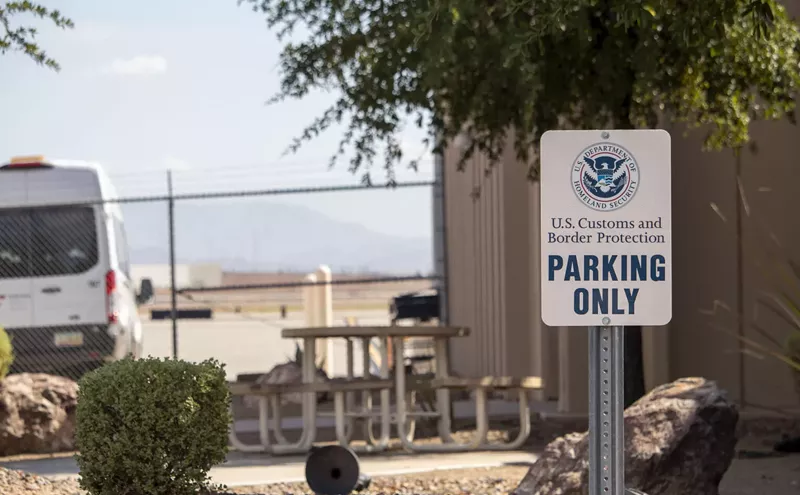Now, an examination of public records reveals that Arpaio failed for years to demonstrate that he had the proper credentials to operate the county jails. This violates a state law that went into effect in 2003 and requires sheriffs to annually provide the Arizona Department of Health Services with proof that their jails meet national standards. From 2003 to 2007, Arpaio failed to provide such proof to the department.
In 2008, Arpaio finally provided a certificate of national accreditation. But that same accreditation was revoked last month when the National Commission on Correctional Health Care decided that the jails do not meet U.S. standards.
This applies to all Maricopa County jail facilities.
The commission, which has accredited Arpaio's jails since 2003, wrote that jail personnel provided "false information" about the true conditions in the jails. The allegation aligns with New Times reports last year ("Inhumanity Has a Price," December 20, 2007) and last month ("Was Juan Mendoza Farias Beaten to Death by Sheriff Joe Arpaio's Guards?" September 11).
It's unclear what the loss of the accreditation will mean in a practical sense. Arizona Department of Health Services spokeswoman Laura Oxley confirms that state law requires Arpaio to prove accreditation, but she says the statute is unclear about how the ADHS should reprimand a sheriff who violates that law — or what her department should do when a sheriff loses accreditation.
And it's true. The statute does not offer any remedy if the law is broken, even though an almost identical law requires the ADHS to go in and inspect if state prisons lose their accreditation.
"[The statute] imposes duties and responsibilities on the sheriff," says Phoenix attorney David Farren. But Farren agrees that the statute fails to name any repercussion for a sheriff who violates it.
"If the sheriff doesn't do that, what's the remedy? I can't answer that," he says. "Regardless of the remedy, though, someone should enforce it."
Arpaio's loss of accreditation comes as he faces re-election and awaits a ruling in a class-action lawsuit that could put his jails under federal control. That lawsuit, Hart v. Arpaio, is one of more than 2,200 jail-condition suits filed against Arpaio in federal court.
Hart v. Arpaio is brought on behalf of all detainees who have awaited trail in Arpaio's jails. The detainees allege that the jails are operated unconstitutionally because of substandard healthcare and other civil rights violations. Margaret Winter, associate director of the National Prison Project with the American Civil Liberties Union and Phoenix attorney Debra Hill represent the plaintiffs.
The trial concluded in early September, and U.S. District Court Judge Neil Wake had not issued a ruling by press time.
During court proceedings, attorneys hired to represent Arpaio and the county touted the National Commission on Correctional Health Care accreditation as outside proof that Maricopa's jail standards are humane and constitutional.
Repeatedly, plaintiff's attorneys Winter and Hill answered that accreditation alone does not guarantee that jail conditions are constitutional ("Hart v. Arpaio Civil Rights Class-Action Suit Awaits Verdict," September 11).
By the county's own arguments during Hart v. Arpaio, the withdrawal of NCCHC accreditation means that Arpaio's jails are not meeting constitutional minimums, nor are they complying with past court orders.
Testimony in the lawsuit actually led to the termination of Arpaio's accreditation, according to a letter to the sheriff from Edward Harrison, president of the NCCHC. He wrote that jail officials provided "false information" about the treatment of chronically ill patients.
Harrison added that court testimony during Hart v. Arpaio proved that the jail was not living up to what it had told accreditors. (A copy of Harrison's letter is posted on New Times' Valley Fever blog.)
"It's a pretty big event," attorney Debra Hill says of the accreditation loss.
The NCCHC accredits about 450 jails and prisons and is the largest accreditor of correctional healthcare in the United States.
Elizabeth Piatek, assistant director of accreditation at the NCCHC, says she cannot comment on the specific violations that led to Arpaio's termination but says that such a drastic move by the commission is rare.
In 2003, the jails were inspected by both the Arizona Department of Health Services and the NCCHC. (New Times has an outstanding request for the state inspections from 2003 and previous years.)
In 2003, Maricopa and other counties successfully lobbied to change Arizona law so that state officials could not inspect county jails. Since then, sheriffs have been required only to submit proof of national accreditation.
In December 2007, New Times reported that the sheriff would not produce certificates of national inspection for the newspaper. One month later, ADHS program manager Kathryn McCanna wrote a letter to Arpaio, requesting the certificates and citing the state law.
In 2008, Arpaio's staff delivered to the ADHS a certificate of accreditation from the NCCHC.
In 2006, Arpaio's accreditation was put on "probation," the letter from the NCCHC shows. It was then fully reinstated — based on statements that jail personnel made to the NCCHC — before being terminated on September 25, 2008.
Even with Arpaio's accreditation terminated, Oxley says, the ADHS will not be inspecting Arpaio's facilities anytime soon because the law does not prescribe any punishment if a jail loses its accreditation.
"If you look at the section on the Department of Corrections, there's very precise directions of what to do [if accreditation is revoked]," Oxley says. But the paragraph about county jails doesn't give the ADHS power to enforce health regulations.
"The Legislature did not provide any other direction, except to tell the jail that [it] must obtain the accreditation," Oxley says.
"Prior to 2003, the ADHS did inspect the health facilities in county jails. The [Legislature] needs to create the next step for resolution," she says.
It's generally thought that national accreditation is easier to come by than passing ADHS inspection. But from 2003 to 2007, the ADHS failed to even enforce the law that requires proof of jail inspections.
"In 2003, when the law changed, the Department of Health Services reassigned personnel within the Division of Licensing Services," Oxley says. "The county was responsible for filing the report for the department to keep on file. When the lack of certificates was discovered in early 2008, a request was sent immediately to all county sheriffs to comply with the law."
For those familiar with conditions in Maricopa County jails, the decision from the NCCHC is hardly surprising.
As New Times has reported, the jails' own correctional healthcare expert resigned on February 20, citing unconstitutional conditions. Dr. Todd Wilcox also cited the growing number of lawsuits the county has been losing. New Times has determined that cost of those lawsuits totals more than $43 million.
Additionally, national accreditation has been a first line of defense in lawsuits brought by individual inmates against Arpaio. With jail accreditation gone, such lawsuits (filed in both county and federal courts) have a better chance of securing hearings or judgments.
"We regret that the jails have not been able to maintain compliance with the NCCHC's standards and provided information that was not accurate," Harrison's letter said. "We sincerely hope that health services at the jails improve to the point that the Maricopa County Sheriff's Office can once again achieve NCCHC accreditation."
Maricopa County Correctional Health Services provides healthcare to inmates in Arpaio's jails. Betty Adams, director of CHS, sent a rebuttal to the NCCHC's letter last week.
The NCCHC will review Adams' rebuttal and decide whether it should continue the termination or reinstate it. Until that decision is made, the termination is on hold.
The responsibilities of Arpaio and Correctional Health Services in the jails are intertwined and poorly defined, as demonstrated by both the NCCHC decision and the Hart v. Arpaio case.
CHS was established in 1992 as a separate department from the MCSO, but CHS must rely on Arpaio's personnel to do its job. CHS provides healthcare for those detained in the jails and juvenile court system, but Arpaio is responsible for feeding, housing, and transporting inmates to CHS.
As such, Arpaio is liable for inmates who are injured in the jail, malnourished, or not delivered to CHS. If inmates are mistreated in medical practitioners' care, CHS is liable.
To further confuse things, the NCCHC letter was addressed to Arpaio, and Arizona law expressly reads that the "sheriff" must provide proof of healthcare accreditation in the jail.
However, Arpaio and CHS are separate defendants with separate attorneys (all paid with county taxpayer dollars) in the Hart v. Arpaio suit.
In 2004, Arpaio asked the county Board of Supervisors to give him control of CHS and its budget, but the supervisors refused.
Increasingly, plaintiffs who sue the sheriff list CHS as a second defendant, because the overlap of jail conditions and healthcare are often inseparable in cases of wrongful death.
Sheriff's spokesman Paul Chagolla did not return a message seeking comment for this story. County Supervisor Chairman Andy Kunasek and Supervisor Mary Rose Wilcox did not return messages either.
But plaintiff's attorneys in Hart v. Arpaio had plenty to say.
"We commend the NCCHC for its decision to terminate its accreditation of Maricopa County Jails for failing to meet essential standards and providing false information to the Commission," Winter says.
"This decision is long overdue, as medical and mental healthcare in the jails have been grossly inadequate for years. We hope that the NCCHC's decision will be a reality check for Sheriff Joe Arpaio that even the self-proclaimed 'toughest sheriff in America' has to abide by the Constitution."












